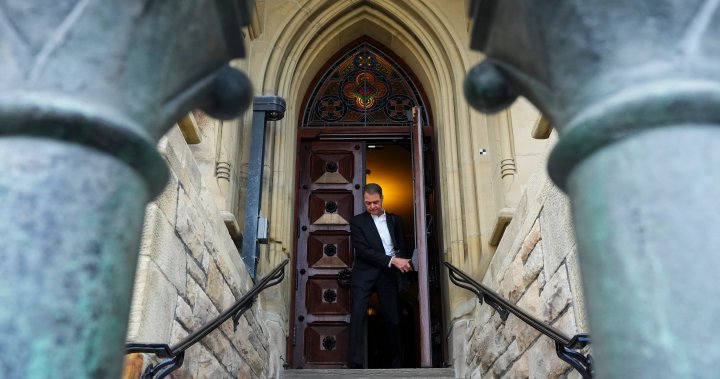Seven candidates vying to be the next House of Commons Speaker made their pitch to MPs on Tuesday ahead of a historic vote, with all saying they want to restore confidence in Parliament.
Former Speaker Anthony Rota, who resigned after he asked MPs to honour a man who fought for the Nazis, was not in his seat during the election, with a seat-filler in his place instead.
Liberal MP Sean Casey kicked off the speeches saying there needs to be a reset in the House when it comes to decorum, while Liberal MP Alexandra Mendes said more than anything, civility is needed.

Nova Scotia Conservative MP Chris d’Entremont, who was most recently a deputy Speaker, said it’s important for him to protect the right of MPs to speak in the House, and that his calm French-Canadian demeanour is right for the job.
Liberal MP Greg Fergus, whom the Tories perceive as the prime minister’s choice, said every MP in the chamber has more in common than they care to admit and that he would lead firmly, thoughtfully and collaboratively.

Green Party Leader Elizabeth May, who delivered her speech virtually due to health issues, said she is running so that she can make her concerns known: that the next Speaker must follow the rules.
Liberal MP Peter Schiefke promised that if he’s elected, he would create a policy around due diligence for guests of the Speaker in the House of Commons. He also said he would apologize to his counterpart in Ukraine for the issue that led to his predecessor’s resignation.
Two assistant deputy Speakers – the NDP’s Carol Hughes, from Ontario, and Liberal Alexandra Mendes from Quebec – are also running.

Liberal MP Stephane Lauzon withdrew from the election just before speeches got underway.
Prime Minister Justin Trudeau and NDP Leader Jagmeet Singh were in attendance during the speeches, but Conservative Leader Pierre Poilievre was absent, as was Bloc Quebecois Leader Yves-Francois Blanchet.
Following speeches, candidates mingled with other MPs from all sides, appearing to vie for their support as an anonymous ranked ballot voting process got underway.

MPs rank their candidate in order of their preference, but it’s not necessary to rank all seven candidates. There would only be a second vote in order to break a tie.
Rota had stepped down from the role a week ago amid international controversy over his actions during a recent visit by Ukraine’s president.
Rota invited a veteran who served in a Nazi unit in the Second World War to the House of Commons chamber, and asked parliamentarians and dignitaries to applaud the man as a hero.
Tuesday’s election is considered rare because it’s happening mid-sitting rather than right after an election.
Liberal MPs gathered early in the morning for a caucus meeting with Trudeau to discuss the vote.
Following the meeting, Fergus said: “I’m feeling nervous but I’m feeling optimistic.”
Other MPs were mum on who they’d vote for, while Transport Minister Pablo Rodriguez said he’ll be voting for the “best candidate.”
Asked how the Liberal caucus was doing mid-way through their meeting to discuss their strategy, Immigration Minister Marc Miller quipped: “We’re doing math. It’s complicated. Where have you been the last eight years?”
© 2023 The Canadian Press



